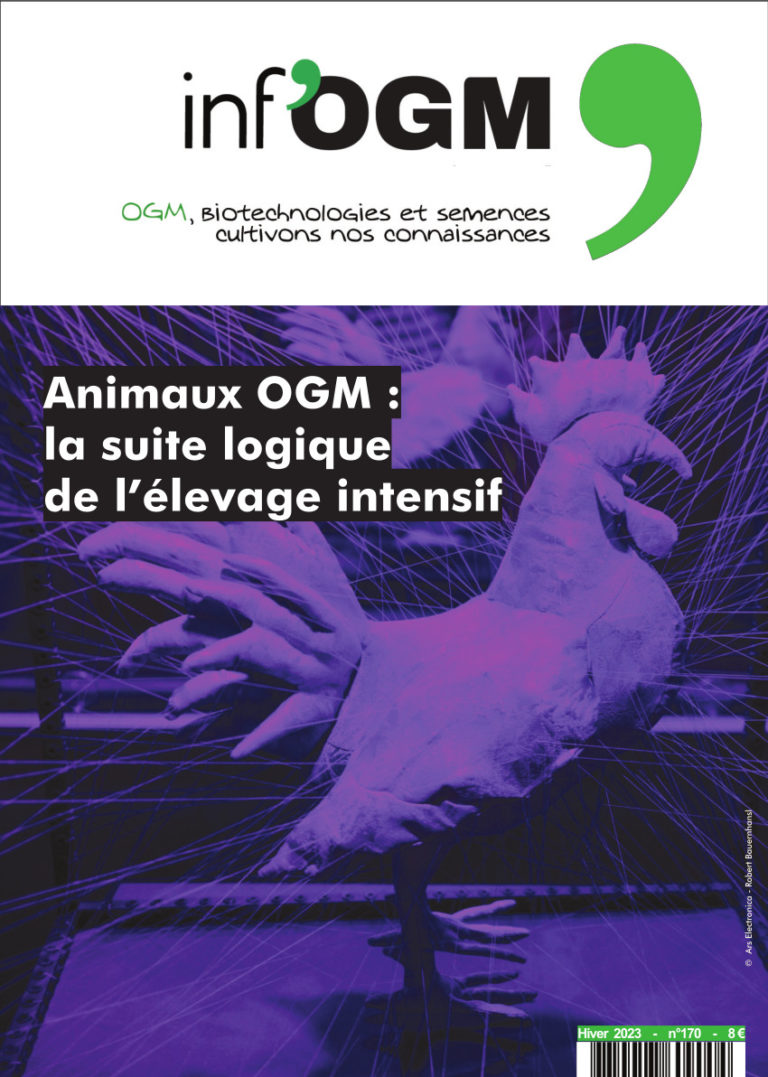GMO : animals authorised… without formalities
#170 - 2023 - january - marchArgentina and Japan have authorised three genetically modified fish using the Crispr/Cas9 molecular tool. For these two countries, these are not GMOs. In December 2018, in Argentina, a genetically modified (GM) tilapia produced by AquaBounty was exempted from the marketing authorisation requirement [1]. A victory for the same company, which had taken almost twenty years to […]
GMOs : making animals sick to hope to cure us
#170 - 2023 - january - marchIn 2019, in France, 1,865,403 animals were used for experimental purposes [1]. This number of animals was fairly stable between 2015 (414,164 of which 89,708 with a damaging phenotype) and 2017 (428,606 of which 53,076 with a damaging phenotype), but a peak was observed in 2018 : 484,463 animals of which 56,412 with a damaging phenotype ; of […]
GMOs : a further step in the loss of autonomy for farmers
#170 - 2023 - january - marchFor several decades we have been witnessing a drastic reduction in the autonomy of farmers, who have become mere labourers. Farmers may soon have to deal with the arrival of GMO animals, which will certainly reinforce this phenomenon. The stranglehold of a few companies on the animal production chain has become the norm, at least […]
Are precision cattle farming and animal welfare can be reconcilable ?
#170 - 2023 - january - marchPrecision agriculture, the new avatar of agribusiness, invests in robotics, digital technology and genetics [1]. This technological overkill is presented as a solution to many of the failures of industrial agriculture. In the livestock sector, will it allow, as it is often put forward, to improve the living conditions of animals ? hors note that the effectiveness […]
GMOs : when mammoths are Trojan horses
#170 - 2023 - january - marchThe rampant industrialisation of our environment over the past century has led to the disappearance of many living species. This sixth mass extinction is the first one specifically attributed to human action. In the face of this observation, several political and scientific approaches have been proposed, which do not tackle the causes but try […]
GMO and sterile insects : not very efficient
#170 - 2023 - january - marchA certain number of insects are considered as pests, because they carry diseases or are parasites on crops. There are many ways to combat them : chemical insecticides, pheromone traps, induced sterility, etc. Several techniques are being developed to induce sterility in an insect. These techniques – radiation mutagenesis, transgenesis, inoculation with the bacterium Wolbachia [1] […]
GMO animals : accelerated growth with deleterious effects
#170 - 2023 - january - marchMore meat, milk, wool, etc. have always been some of the objectives of animal selection. For meat, two genetic modification strategies have been implemented : influencing the level of growth hormone, or blocking the gene responsible for the production of myostatin, a hormone that inhibits muscle growth. Research that is far from improving animal welfare… […]
Hornless GM cattle : a false solution
#170 - 2023 - january - marchSo far, few genetically modified livestock have been approved for marketing. But new mutagenesis techniques could change this. One modification that has already been authorised concerns hornless beef cattle : is this really a good idea ? The US company Recombinetics [Recombinetics] is a US biotechnology company founded in 2008, specialising in genetic modification of animals […]

GMO animals : the logical continuation of intensive farming
#170 - 2023 - january - marchThe current trend is for livestock farms to obey the « triptych » : digital, robotic, genetic technologies. This is in the name of innovation, profitability and, curiously, in the name of “animal welfare” [1]. Currently, very few GM animals are marketed and sales remain very low. As with plants, genetic engineering aims to accelerate the selection of certain […]
A minority of states support deregulation of new GMOs
#168 - 2022 - july - septemberMany States currently reflect on the legal status of GMOs resulting from new genetic modification techniques, and some have already decided. It is not easy to give an exhaustive picture of all the positions and legislation adopted : it is sometimes difficult to have access to national legislation, national positions may be unclear at this stage, […]
Patents on life, a US ” invention ”
#168 - 2022 - july - septemberHistorically, the protection of living organisms through patents has been developed in the United States and Europe. Abandoning a then conservative position, the US Supreme Court validated a patent on a genetically modified (GM) bacterium in 1980 [1]. This institution defined the micro-organism as a « composition of matter », opening up the field of patentability of living […]
The appropriation of living organisms: can we still control digitalization?
#162 - 2021 - january - marchFor the time being, digital sequence information allows certain stakeholders, including companies, to use digitalized sequences without needing the prior consent of the states and communities connected with this biodiversity. Discussions are underway in order to regulate – or not – practices which contravene the Convention on Biological Diversity. Countries allowing free access to the […]


